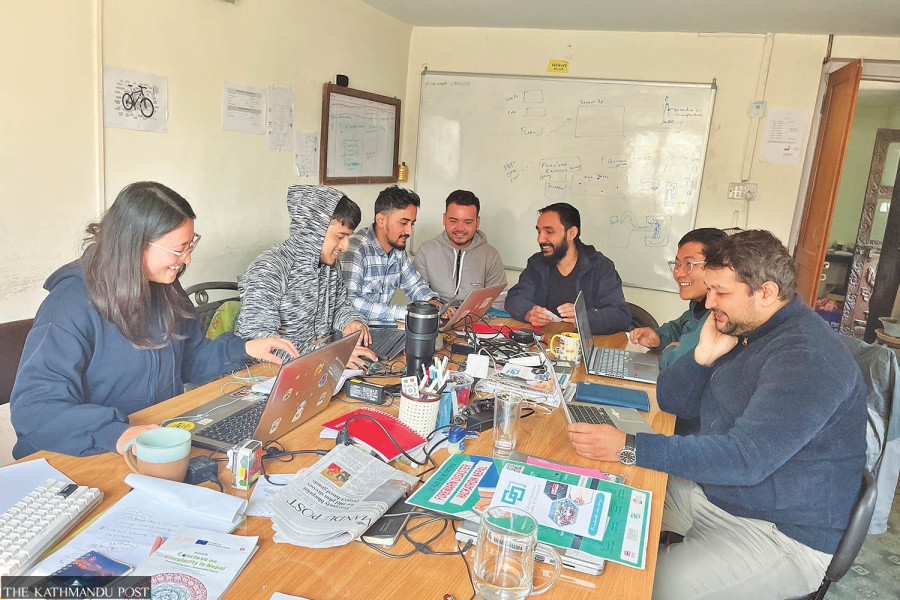Climate & Environment
GD Labs to bring bike rental stations to Lalitpur with Greenway app
The company fosters Nepali youths’ sustainable innovation.
Ellie Davis
Green Decision Labs and Research doesn’t have just one idea for how to make Nepal’s cities more sustainable.
Its most recent venture, Greenway, hopes to help the people in Kathmandu have more sustainable lifestyles. Within the next month, GD Labs plans to bring the first bicycle rental stations to Kathmandu, with two bike pickup and drop-off stations in Lalitpur.
“From Greenway, we were promoting cycling activities to provide an alternative to motorbikes and other motor vehicles that are emitting carbon,” GD Labs Co-founder Bijay KC said.
The Greenway venture is a collaboration between GD Labs and the Cycle City Network Nepal. The former provides engineering and design skills, and the latter is a group of people in Kathmandu who are passionate about cycling.
The existing “Greenway” app also provides users with information about where they can buy sustainable products within Kathmandu and allows them to track the amount of carbon they have avoided producing by opting for a bike ride rather than a motorised vehicle.
According to the distance they ride on a bike, Greenway’s users can earn “Green Up Points”, which they can use to purchase green products or future bike rides. At one of the bike return stations, Greenway plans to open a retail store with locally-produced sustainable products.
As higher costs of sustainable goods often turn customers away, Business Associate at GD Labs Pravesh Panthi hopes that the Green Up Points will encourage consumers to switch to purchasing sustainable products.
With this sustainable currency, Greenway hopes that their platform will create a sustainable marketplace for goods in Kathmandu.
“Through Greenway’s cycling initiative, we envision cleaner air, less congestion, and a shift towards sustainable urban living, making Nepal’s cities healthier and more livable for everyone,” Panthi said.
Through Greenway and other ventures, GD Labs has become a hub for young Nepali environmental engineers.
“We take pride in providing people with opportunities to explore their ideas,” Co-founder and CEO Samip Sigdel said. “This, in itself, is a lab—it’s an innovation lab.”
Co-founders Bijay KC, Samip Sigdel, and five others came together in 2019 to start GD Labs while working as interns doing environmental impact assessments for different government infrastructure projects in Nepal. The venture was an outcome of their frustration at the government’s lack of concern for the environment.
“Our recommendations, our suggestions, and our reports were being sidelined,” said KC, who has a background in environmental engineering. “[The government] includes environmental aspects only when it is mandatory.”
Nepal’s Environmental Protection Act-2019 requires all infrastructure projects to conduct environmental impact studies, spending roughly 10 percent of a project’s budget. However, in practice, less than 1 percent of each project’s budget is allocated to environmental impact assessments, according to KC.
The co-founders also felt disillusioned by the environmental work of the development sector in Nepal.
“We found it to be project oriented,” KC said. “Once the project is completed, the impact on the ground vanishes.”
Because Nepal’s government and the public sector allegedly fail to invest in sustainability, GD Lab co-founders decided to create a space where environmental engineers could materialise their own solutions.
“We thought we needed to design our own projects,” KC said. “We need to identify the problems ourselves, and we need to design that solution as a business model.”
GD Labs operates as a private company rather than a non-profit because they want to create environmental solutions that are also financially sustainable.
“We have to design the project in such a way that the project can generate revenue and sustain itself,” KC said.
GD Labs also works to encourage the next generation of environmental engineers and innovators to bring their ideas to fruition. In collaboration with Start Network, a UK-based NGO, GD Labs ran a “Hackathon,” during which young environmental engineers could submit their ideas to GD Labs for how to use technology to predict and prepare for natural disasters.
“We're bringing in their ideas, we are mentoring them,” KC said.
Although many young people with engineering experience go abroad—including two of GD Lab’s currently working co-founders—GD Labs has become a hub for young, innovative engineers with ideas for how to make urban life more sustainable.
“Young people look at the company and get interested and become a part of it—full-time, part-time, or as volunteers,” Sigdel said.
With every project that GD Labs tackles, a new idea emerges.
“We are always thinking about new things—what can be done,” Research Officer Sampada Shrestha said. “There are a lot of challenges, but there is also a lot of fun tackling those challenges.”




 18.37°C Kathmandu
18.37°C Kathmandu














